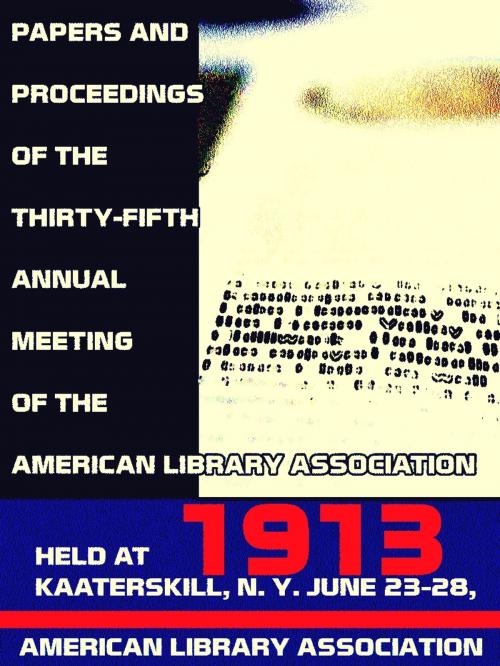Papers and proceedings of the thirty-fifth general meeting of the American Library Association, 1913
Nonfiction, History, Reference, Biography & Memoir, Historical, Americas, United States| Author: | Various, American Library Association | ISBN: | 1230000275209 |
| Publisher: | AMERICAN LIBRARY ASSOCIATION | Publication: | October 20, 2014 |
| Imprint: | Language: | English |
| Author: | Various, American Library Association |
| ISBN: | 1230000275209 |
| Publisher: | AMERICAN LIBRARY ASSOCIATION |
| Publication: | October 20, 2014 |
| Imprint: | |
| Language: | English |
Example in this ebook
PRESIDENT'S ADDRESS
The World of Print and the World's Work
I
Turning for a text to Victor Hugo's stirring epic of Paris, these words may be found in the section for May, and in the third chapter thereof:
A Library implies an act of faith
Which generations still in darkness hid
Sign in their night, in witness of the dawn.
When Johann Gutenberg in his secret workshop poured the molten metal into the rough matrices he had cut for separate types, the instrument for the spread of Democracy was created. When early Cavaliers and Puritans planted the crude beginnings of free public schools, the forces of Democracy were multiplied. When half a century ago the first meager beginnings of the public library movement were evolved, Democracy was for all time assured. Thus have three great stages, separated each by a span of two hundred years from that preceding, marked that world development whose ultimate meaning is not equality of station or possession, but equality of opportunity.
Not without stress and strife have these yet fragmentary results been achieved. Not without travail and difficulties will universal acceptance be accorded in the days to come. But no one may doubt the final outcome which shall crown the struggle of the centuries. The world was old when typography was invented. Less than five centuries have passed since then, and in this interval—but a brief period in the long history of human endeavor—there has been more enlargement of opportunity for the average man and woman than in all the time that went before. Without the instrumentality of the printed page, without the reproductive processes that give to all the world in myriad tongues the thought of all the centuries, slavery, serfdom and feudalism would still shackle the millions not so fortunate as to be born to purple and ermine, and fine linen.
II
The evolution of the book is therefore the history of the unfoldment of human rights. The chained tome in its medieval prison cell has been supplanted by the handy volume freely sent from the hospitable public library to the homes of the common people. The humblest citizen, today, has at his command books in number and in kind which royal treasuries could not have purchased five hundred years ago. In the sixteenth century, it took a flock of sheep to furnish the vellum for one edition of a book, and the product was for the very few; in the twentieth, a forest is felled to supply the paper for an edition, and the output goes to many hundred thousand readers. As books have multiplied, learning has been more widely disseminated. As more people have become educated, the demand for books has increased enormously. The multiplication of books has stimulated the writing of them, and the inevitable result has been a deterioration of quality proportioned to the increase in quantity. In the English language alone, since 1880, 206,905 titles of books printed in the United States, have been listed, and 226,365 in Great Britain since 1882. Of these 433,270 titles, 84,722 represent novels—36,607 issued in the United States and 48,115 in Great Britain. Despite the inclusion of the trivial and the unsound in this vast mass of printed stuff, no one can doubt the magnitude of the service performed in the advancement of human kind. The universities have felt the touch of popular demand, and in this country at least some of them have attempted to respond. Through correspondence courses, short courses, university week conferences, summer schools, local forums, traveling instructors, and other media of extension, many institutions of higher learning have given recognition to the appeal of the masses. Logically with this enlargement of educational opportunity, the amplification of library facilities has kept pace. The libraries have become in a real sense the laboratory of learning.
To be continue in this ebook...............................................................................................................
Example in this ebook
PRESIDENT'S ADDRESS
The World of Print and the World's Work
I
Turning for a text to Victor Hugo's stirring epic of Paris, these words may be found in the section for May, and in the third chapter thereof:
A Library implies an act of faith
Which generations still in darkness hid
Sign in their night, in witness of the dawn.
When Johann Gutenberg in his secret workshop poured the molten metal into the rough matrices he had cut for separate types, the instrument for the spread of Democracy was created. When early Cavaliers and Puritans planted the crude beginnings of free public schools, the forces of Democracy were multiplied. When half a century ago the first meager beginnings of the public library movement were evolved, Democracy was for all time assured. Thus have three great stages, separated each by a span of two hundred years from that preceding, marked that world development whose ultimate meaning is not equality of station or possession, but equality of opportunity.
Not without stress and strife have these yet fragmentary results been achieved. Not without travail and difficulties will universal acceptance be accorded in the days to come. But no one may doubt the final outcome which shall crown the struggle of the centuries. The world was old when typography was invented. Less than five centuries have passed since then, and in this interval—but a brief period in the long history of human endeavor—there has been more enlargement of opportunity for the average man and woman than in all the time that went before. Without the instrumentality of the printed page, without the reproductive processes that give to all the world in myriad tongues the thought of all the centuries, slavery, serfdom and feudalism would still shackle the millions not so fortunate as to be born to purple and ermine, and fine linen.
II
The evolution of the book is therefore the history of the unfoldment of human rights. The chained tome in its medieval prison cell has been supplanted by the handy volume freely sent from the hospitable public library to the homes of the common people. The humblest citizen, today, has at his command books in number and in kind which royal treasuries could not have purchased five hundred years ago. In the sixteenth century, it took a flock of sheep to furnish the vellum for one edition of a book, and the product was for the very few; in the twentieth, a forest is felled to supply the paper for an edition, and the output goes to many hundred thousand readers. As books have multiplied, learning has been more widely disseminated. As more people have become educated, the demand for books has increased enormously. The multiplication of books has stimulated the writing of them, and the inevitable result has been a deterioration of quality proportioned to the increase in quantity. In the English language alone, since 1880, 206,905 titles of books printed in the United States, have been listed, and 226,365 in Great Britain since 1882. Of these 433,270 titles, 84,722 represent novels—36,607 issued in the United States and 48,115 in Great Britain. Despite the inclusion of the trivial and the unsound in this vast mass of printed stuff, no one can doubt the magnitude of the service performed in the advancement of human kind. The universities have felt the touch of popular demand, and in this country at least some of them have attempted to respond. Through correspondence courses, short courses, university week conferences, summer schools, local forums, traveling instructors, and other media of extension, many institutions of higher learning have given recognition to the appeal of the masses. Logically with this enlargement of educational opportunity, the amplification of library facilities has kept pace. The libraries have become in a real sense the laboratory of learning.
To be continue in this ebook...............................................................................................................















